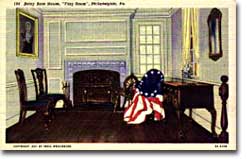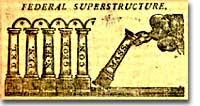
16. Ratifying the Constitution

The Flag Room — The United States is born.
A framework for a new and stronger national government had been crafted at the Philadelphia Convention by a handful of leaders. But how could their proposed system be made into law?
Could they convince the public that the weak central government of the Articles of Confederation needed to be strengthened? The Articles required that any changes in constitutional law be presented to the state legislatures, and that any successful alteration required unanimous approval. Since the new proposal increased the power of the national government at the expense of state sovereignty, it was a certainty that one, and probably several more, state legislatures would oppose the changes. Remember, that Rhode Island had refused to even send a delegate to the Philadelphia Convention because it opposed any stronger revisions in the Articles, much less the sweeping proposal that ended up being produced there.
Aware of the major challenge before them, the framers of the new plan crafted a startling new approach through a ratifying procedure that went directly to the people. By this method, the Constitution would become law if nine of the thirteen states approved it after holding special conventions to consider the issue. Building on a model adopted by Massachusetts in passing its state constitution of 1780, the framers suggested that constitutional law was of such sweeping significance that it would be inappropriate to have it approved though ordinary political channels.

The caption under this cartoon, which appeared in 1788 in the Massachusetts Centinel, stated "The Pillar of the Great Federal Edifice rises daily." It depicts Massachusetts as an addition to the "Federal Superstructure," indicating Massachusetts' impending ratification of the Constitution.
Instead, special conventions should be held for the people to evaluate such important changes. Politicians in Congress were well aware of the weaknesses of the current central government and shared the framers' sense that the state legislatures were very likely to oppose the new plan, so Congress approved the new terms of this unusual, and even illegal, ratification route. Surprisingly, so too did state legislatures that began arranging for the election of special delegates to the state ratification conventions.
A great debate about the future of the nation was about to begin.





